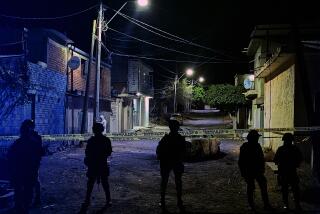Detainee claims innocence, torture
A Pakistani national who U.S. officials believe scouted potential American targets for Al Qaeda attacks has told a military tribunal at Guantanamo Bay, Cuba, that he had no ties to the terrorist group and insisted he was tortured by American interrogators after being captured by Pakistani authorities in 2003.
U.S. officials contend that Majid Khan -- one of 14 “high-value” detainees who was moved to Guantanamo from a secret CIA prison in September -- was sent by Al Qaeda mastermind Khalid Shaikh Mohammed to research plots to blow up gas stations or to poison reservoirs in the U.S.
Khan, who is in his mid-20s, lived in the Baltimore area after his family moved there in 1996. U.S. officials say Mohammed selected him in part because of his English language skills and “extensive knowledge” of the U.S.
But during a hearing at Guantanamo last month, Khan said he had never worked for Al Qaeda, and accused U.S. authorities of either making up evidence against him or coercing witnesses to make false claims.
“After watching too much Fox News, I learned that to become Al Qaeda, a person needs to go to Afghanistan for training, and take an oath in front of Osama bin Laden for their cause,” Khan told the three-officer tribunal, according to a transcript released Tuesday by the Pentagon. “I’ve never been to Afghanistan or met UBL; to prove it, I can take a lie detector test.”
The tribunals are used by military authorities to formally determine whether detainees are enemy combatants who can be held indefinitely.
Khan is not the first of the high-value detainees to deny Al Qaeda membership or to accuse the U.S. of using torture. But the transcript of Khan’s hearing provides some of the most detailed testimony yet about the detainees’ lives at Guantanamo, and painstakingly describes his allegations of mistreatment by U.S. and Pakistani authorities in the months after his capture in Karachi.
According to a statement read by Khan’s personal representative, an Air Force major whose name was withheld, Khan twice has tried to kill himself by chewing his arteries, and on two occasions has had his beard forcibly shaved, a move he claimed was intended to humiliate him, since long beards are a sign of piety in Islam.
“They just came in with eight guards and took me to main rec [the main recreation area] and forcibly shaved my beard to humiliate me and offend my religion,” Khan said in the statement. “While they were shaving my beard, [a female psychiatric official] was watching the whole thing.”
Khan’s list of alleged abuses at the hands of U.S. authorities ranges from the serious, such as forcible feedings during a hunger strike, to the more mundane, like complaints that detainees must use “cheap-branded, unscented deodorant soap” to wash. He also alleged authorities had routinely taken away personal items as a form of punishment.
The Red Cross “gave me my only daughter pictures, which was born after my abduction,” Khan said in his written statement. “When I took this picture and came back to my camp building, the guard forcibly took it from me. Then I went crazy and yelled for one hour and they ignored me.”
Navy Cmdr. Jeffrey D. Gordon, a Pentagon spokesman, denied that Khan was mistreated.
Significant portions of the hearing transcript were blocked out by U.S. censors, including sections in which Khan appears to detail his treatment at the hands of CIA agents before he was sent to Guantanamo. Khan’s lawyers said that he had described abuses at the hands of his CIA captors, allegations agency officials have denied.
“Majid’s mistreatment is appalling given that the U.S. has neither offered reliable evidence nor brought any charges against him after four years of secret detention,” said Gitanjali Gutierrez, an attorney at the Center for Constitutional Rights, which is representing Khan.
In court filings, the CIA has insisted its interrogation techniques must remain classified because they are sensitive national security secrets.
Khan testified, however, that he thought his treatment at Guantanamo was worse than his detention by the CIA.
“I swear to God, this place in some sense [is worse] than CIA jails,” Khan said in his statement, according to the transcript. “I am being mentally tortured here.”
The hearing for Khan, formally called a Combatant Status Review Tribunal, has come under legal challenge by attorneys representing detainees.
At a federal appeals court hearing Tuesday in Washington, Bush administration lawyers were grilled by judges considering a case that challenges the tribunal process. Justice Department lawyers insisted that legislation establishing the tribunals only intended a narrow review by federal appeals courts.
*
The Associated Press contributed to this report.
More to Read
Sign up for Essential California
The most important California stories and recommendations in your inbox every morning.
You may occasionally receive promotional content from the Los Angeles Times.








